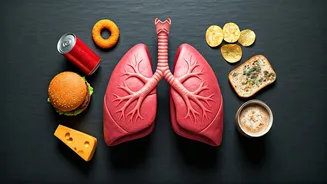Processed Meats
Processed meats, often found in convenience foods and fast food, can pose a risk to lung health. These meats often contain nitrates, which are used as preservatives.
When exposed to high heat, these nitrates can transform into nitrosamines, compounds that have been linked to lung inflammation and an increased risk of respiratory problems. The high salt content in processed meats can also contribute to fluid retention, which may impact lung function. Individuals concerned about their respiratory health are advised to limit their intake of items such as bacon, sausages, and deli meats, and opt for fresh, unprocessed alternatives whenever possible. Being mindful of these choices will support better lung health.
Sugary Beverages
Sugary drinks, including sodas, energy drinks, and fruit juices with added sugar, can be detrimental to lung health. These beverages often contain high amounts of refined sugar, which can trigger systemic inflammation throughout the body. Chronic inflammation is known to affect the lungs, potentially leading to increased susceptibility to infections and exacerbating respiratory conditions like asthma or chronic obstructive pulmonary disease (COPD). Moreover, the excess sugar in these drinks can contribute to weight gain, which can put additional pressure on the lungs and decrease their capacity. Replacing sugary drinks with water or unsweetened alternatives is a beneficial step towards preserving respiratory health.
Refined Carbohydrates
Refined carbohydrates, like white bread, white rice, and pastries, are another category of foods that can negatively affect lung health. These foods are rapidly digested, causing quick spikes in blood sugar levels. This, in turn, can contribute to inflammation, similar to the effects of sugary drinks. Chronic inflammation can cause the airways to narrow, potentially making breathing more challenging. Furthermore, refined carbohydrates often lack essential nutrients like fiber, which are important for overall health and can indirectly support lung function. For individuals looking to maintain healthy lungs, choosing whole grains and fiber-rich foods is a better choice.
Dairy Products
Dairy products, particularly those with high fat content, can sometimes worsen respiratory symptoms. Some individuals find that dairy products increase mucus production, which might lead to congestion and coughing. The proteins in dairy can also trigger inflammatory responses in sensitive individuals, potentially exacerbating asthma or allergy-related breathing issues. While dairy does contain nutrients, it is suggested to moderate dairy consumption, and consider alternatives such as plant-based milk products like almond or soy milk if experiencing respiratory problems. Observing how dairy intake impacts one's health can help guide dietary choices for better lung health.
Fried Foods
Fried foods are often prepared with unhealthy oils and can cause problems for lung health. When food is fried, it absorbs a significant amount of oil, which can lead to weight gain, thereby increasing strain on the lungs. The process of frying can also generate harmful compounds. These compounds contribute to inflammation in the body. The combination of these factors can make it more challenging to breathe, especially for individuals already dealing with respiratory problems. It's often recommended that people with lung conditions opt for baked, steamed, or grilled foods to avoid the negative effects of fried items. Healthy cooking methods can significantly impact respiratory well-being.
Salty Foods
Consuming excessive amounts of salt can lead to fluid retention, potentially affecting lung health. High sodium intake can cause the body to retain water, which may lead to swelling in the lungs and make breathing more difficult. This is especially problematic for individuals with conditions like asthma or COPD. Many processed and packaged foods contain high levels of sodium, so being mindful of food labels and reducing the intake of these items can be beneficial. Cooking meals at home with fresh ingredients, where one can control the salt content, is a good strategy to promote respiratory wellness. Being aware of salt intake is crucial for preserving lung function.
Alcoholic Beverages
Alcoholic beverages, when consumed excessively, can harm lung health. Alcohol can impair the immune system, making the lungs more vulnerable to infections. Chronic alcohol consumption has also been linked to an increased risk of respiratory conditions. Moreover, alcohol can irritate the airways and exacerbate symptoms like coughing and shortness of breath. For those seeking to protect their respiratory health, moderating or avoiding alcohol consumption can be a positive step. Making conscious choices about what one drinks can significantly contribute to better lung function.














